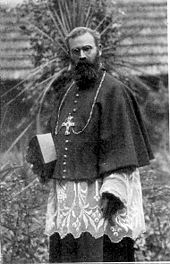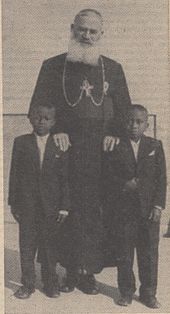Guido Benedikt Beck
Guido Benedikt Beck OFMCap (born December 9, 1885 in Ramberg (Palatinate) , † March 5, 1958 in Villarrica , Chile) was a Catholic priest from the diocese of Speyer , Capuchin Father , Indian missionary, from 1924 Apostolic Prefect of Araucania , Chile , from 1928 Vicar Apostolic and Titular Bishop of Mastaura there until 1958 .
Life
Origin and work in Germany
Guido Benedikt Beck was born in Ramberg, in the southern Palatinate , Diocese of Speyer , Kingdom of Bavaria in 1885 . He spent his youth in Kaiserslautern . He then entered the order of the Bavarian Capuchins in Burghausen and became a novice in the monastery of Laufen , Upper Bavaria. On July 22, 1905, Guido Beck made his perpetual vows and was ordained a priest on June 25, 1910 . He held his primary mass in his native Kaiserslautern in the Marienkirche . Initially, the father worked in the Capuchin monastery in St. Ingbert , in his home diocese of Speyer.
In the mission
Since the Bavarian Capuchins owned a mission district in Chile, in the province of Araucania , the young religious was sent there in 1912, to South America. In his new sphere of activity he was in charge of various pastoral care stations and finally took over an Andean parish. The German father diligently learned Spanish and especially the difficult Indian language Mapudungun , the Mapuche tribe to which large parts of the population belonged. The persistent resistance of the natives had forced the Spaniards in 1641, in the Treaty of Quillin, to recognize an independent Mapuche nation. In this treaty, the Bío-Bío River was established as a border and the Mapuche people were granted sovereignty, a process unique in the history of indigenous peoples in South America. It was not until 1881 that the Mapuche state was forcibly annexed to the meanwhile independent Chile after the French adventurer Orélie Antoine de Tounens , elected by the Indians, temporarily proclaimed a kingdom of Araucania and Patagonia, also called "New France". In 1934 another great Mapuche uprising failed. About a third of the population of Araucania are Indians of this tribe. At the time of Bishop Beck, they mainly operated agriculture, mostly in the higher mountain regions, where the terrain is impassable and the soil is barren. Mapuche means "the people who own the land", a country that is one of the most beautiful regions on earth: mountains like in Switzerland, lakes like in Canada and in between the snow-capped giant cones of smoking volcanoes. But the proud indigenous people only owned a small, unproductive portion of about one percent of their land. When land was nationalized in the 19th century and then redistributed at will, the Chileans took over the better land of the Mapuche in the valley. Immigrant European settlers did the rest and often cheated on the poorly educated Indians when buying land. Since taking over the mission, the Capuchins have made sustained efforts to help the disadvantaged Indians and stood by their side to protect them from the start. This is shown very clearly in the work of Guido Beck.
On January 20, 1925, the Palatinate, who added the local place name to his name in the Capuchin style and called himself Guido Beck de Ramberga , became Apostolic Prefect of Araucania . With this he exercised full control over the mission area, but without having episcopal authority. Otherwise he was equal to a bishop in this position. It was based in the city of Villarrica.
Mission Bishop
In 1928 the mission area was promoted to the Apostolic Vicariate , i.e. a diocese on probation. Pope Pius XI appointed Guido Beck de Ramberga on March 28, 1928 as Vicar Apostolic of Araucania and Titular Bishop of Mastaura . Archbishop Ettore Felici gave him episcopal ordination on August 5th of the same year in the Cathedral of Santiago de Chile ; Co- consecrators were the Austrian missionary bishop Augusto Klinke Leier and the Chilean bishop Rafael Edwards Salas .
Bishop Beck developed an extremely beneficial ministry as Vicar Apostolic. Three main points were important to him: the protection of the Indian population from fraudulent whites, the establishment of a local clergy and the improvement of education by opening schools. The Palatinate bishop founded a seminary , 200 elementary schools, many training workshops and agricultural schools, several home economics schools for girls, a teacher training institute, three hospitals and 39 first aid stations. He also founded a local congregation of sisters. Together with his fellow brothers, he fought for an Indian protection law from the government to ensure the rights of the approximately 120,000 indigenous people. In 1955, the South American Bishops' Conference stated that the Vicariate Apostolic Araucania was the best organized mission in South America.
During the Nazi era, Guido Beck had to endure many abuse and insults from numerous Chile-Germans. He was also spied on about what he said. Nevertheless, he did not forget his old homeland and immediately organized a large-scale relief operation in Chile for the needy German population after the Second World War .
The bishop visited his homeland three times and was always able to recruit missionaries for support. On June 18, 1950, he celebrated his 40th anniversary as a priest in the Palatinate town of Kaiserslautern, and on this - his last - home visit, he confessed: "I'm still a Ramberger with body and soul!" Shortly before, he was in Rome from Pope Pius XII. been received. The Holy Father asked where the bishop came from and said: “From the 'big' city of Ramberg in the Rhine Palatinate.” To this, the Pope answered spontaneously: “Bavaria and Palatinate, God get it!” To his On the 25th anniversary of the bishopric, the pontiff sent him handwritten congratulations in 1953 and the German ambassador in Chile brought a personal congratulatory letter from Federal President Theodor Heuss .

From this year on the health of the shepherd deteriorated noticeably. One day before his death he said to the faithful in the episcopal chapel: “Your bishop is already old and sick and will soon die. You have to pray for him. He won't forget you from above either. ” The next morning, March 5, 1958, after he had just dressed, Beck suffered a stroke at around 8 o'clock and died from it. In the presence of numerous ecclesiastical and secular dignitaries - including from the German embassy - the apostolic nuncio carried out the exequies. As a representative of the Chilean government, the governor of the province of Villarrica found the words:
“ In the name of Chile I say a thousand thanks for the seeds you have sown in this country, a thousand thanks for all the good that you have done to us Chileans. The earth that saw the hour of your birth and the earth that is now welcoming you are equally shaken at this moment ... "
Bishop Beck de Ramberga was buried in the cathedral of Villarrica, where the vicariate was located. In 2001 the diocese of Villarrica was established there . The immediate successor of Bishop Beck as Apostolic Vicar was his auxiliary bishop and coadjutor (since 1956), the Capuchin Wilhelm Hartl from Laufen in Upper Bavaria. His successor Sixtus Josef Parzinger experienced the elevation of his vicariate to a regular diocese.
For jurisdiction area of Bishop Beck also included the famous Easter Island , which he visited several times because there is a Missons field office with leprosy center under the famous Bavarian Capuchin Father Sebastian Englert was.
Works by Bishop Beck
- The mission of the Bavarian Capuchins among the Indians in Chile. Dedicated to friends and supporters of the Indian mission. Altoetting 1929.
literature
- In the quarry of Araucania. Bishop Guido Benedikt Beck from Chile visits his home in the Palatinate. In: Pilger , Speyer, No. 26, from June 25, 1950.
- Bishop Guido Beck - Obituary. In: Pilger , Speyer, No. 11, from March 16, 1958.
- Farewell to a great missionary. Bishop Guido Beck is solemnly buried in Chile. In: Pilger , Speyer, No. 13 of March 30, 1958.
- Guido Beck from Palatinate missionaries Chile. (on the 50th anniversary of death) Pilgrim Calendar Speyer (yearbook of the Speyer diocese), 2008.
Web links
- Entry about Guido Benedikt Beck de Ramberga on catholic-hierarchy.org
- Report on the missionary Heinrich Römer and his bishop Guido Benedikt Beck (PDF document, pages 19-21)
Individual evidence
- ↑ a b The Bavarian Capuchins: ( Page no longer available , search in web archives: The Mission Bishops from Bavaria in Chile )
| personal data | |
|---|---|
| SURNAME | Beck, Guido Benedikt |
| ALTERNATIVE NAMES | Ramberga, Guido de |
| BRIEF DESCRIPTION | Capuchin, Bishop, Prefect Apostolic and Vicar Apostolic of Araucania, Chile |
| DATE OF BIRTH | December 9, 1885 |
| PLACE OF BIRTH | Ramberg (Pfalz) , Germany |
| DATE OF DEATH | March 5, 1958 |
| Place of death | Villarrica (Chile) , Chile |




